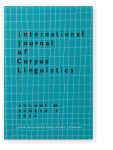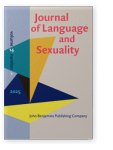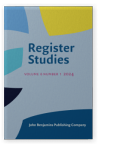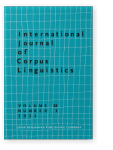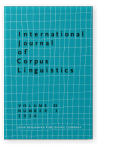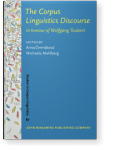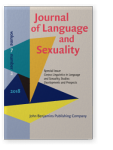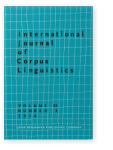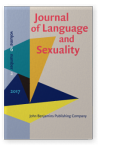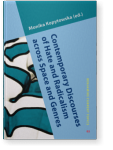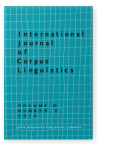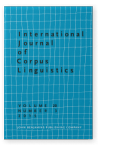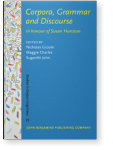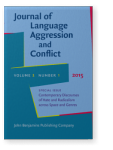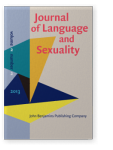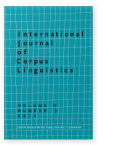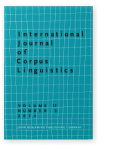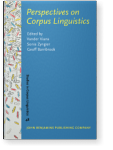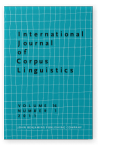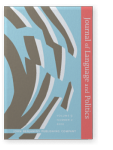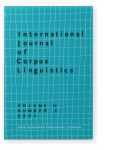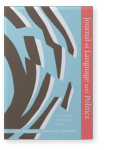Paul Baker
List of John Benjamins publications for which Paul Baker plays a role.
Journals
ISSN 2211-3770 | E-ISSN 2211-3789
2023 A year to remember? Introducing the BE21 corpus and exploring recent part of speech tag change in British English International Journal of Corpus Linguistics 28:3, pp. 407–429 | Article
This paper describes the collection and analysis of the most recent edition of the Brown family, the BE21 corpus, consisting of 1 million words of written British English texts, published in 2021. Using the Coefficient of Variance, the frequencies of part of speech tags in BE21 are compared… read more
2020 Review of Lukin (2019): War and its Ideologies International Journal of Corpus Linguistics 25:3, pp. 360–363 | Review
2018 Keywords: Signposts to objectivity? The Corpus Linguistics Discourse: In honour of Wolfgang Teubert, Čermáková, Anna and Michaela Mahlberg (eds.), pp. 77–94 | Chapter
This chapter focuses on describing, illustrating and critiquing the keywords technique, which is used to automatically identify lexical salience when comparing multiple corpora. Arguably, keywords present researchers with words that they may not have chosen to analyse in advance, thus helping to… read more
2018 Language, sexuality and corpus linguistics: Concerns and future directions Corpus Linguistics in Language and Sexuality Studies: Developments and Prospects, Motschenbacher, Heiko (ed.), pp. 263–279 | Article
In this paper I discuss the potential that corpus linguistics approaches have to make in terms of enabling research on language and sexuality. After giving some background relating to my involvement in the development of this approach and discussion of some of the benefits of using corpus… read more
2018 A corpus-driven comparison of English and French Islamist extremist texts International Journal of Corpus Linguistics 23:3, pp. 255–278 | Article
Using corpus linguistics and qualitative, manual discourse analysis, this paper compares English and French extremist texts to determine how messages in different languages draw upon similar and distinct discursive themes and linguistic strategies. Findings show that both corpora focus on… read more
2017 ‘The sea pulled her skirt up’: The language of same-sex love in Iranian blogs Journal of Language and Sexuality 6:2, pp. 205–231 | Article
This article examines the language used by bloggers in Iran who write about same-sex relationships. Homosexuality is a criminal offence in Iran and discussion of sex is tabooed so blogging potentially acts as a form of empowerment for bloggers who desire such relationships. By conducting a… read more
2017 The hate that dare not speak its name? Contemporary Discourses of Hate and Radicalism across Space and Genres, Kopytowska, Monika (ed.), pp. 99–127 | Article
This chapter uses corpus-based methods to explore how British Parliamentary arguments against LGBT equality have changed in response to decreasing social acceptability of discriminatory language against minority groups. A comparison of the language of opposition to the equalisation of the age of… read more
2016 The shapes of collocation International Journal of Corpus Linguistics 21:2, pp. 139–164 | Article
The tool GraphColl (Brezina et al. 2015) allows collocational networks to be identified within corpora, enabling corpus analysis to go beyond two-way collocation. This paper aims to illustrate the types of linguistic relationships that can appear when more than two words are considered, using graph… read more
2015 ProtAnt: A tool for analysing the prototypicality of texts International Journal of Corpus Linguistics 20:3, pp. 273–292 | Article
Corpus-based researchers and traditional qualitative researchers, such as those interested in critical discourse analysis, are often required to select prototypical texts for close reading that include the language features of interest that are present in a much larger corpus. Traditional… read more
2015 Chapter 12. Does Britain need any more foreign doctors? Inter-analyst consistency and corpus-assisted (critical) discourse analysis Corpora, Grammar and Discourse: In honour of Susan Hunston, Groom, Nicholas, Maggie Charles and Suganthi John (eds.), pp. 283–300 | Article
It is argued that corpus methods help to reduce analyst bias in conducting (critical) discourse analysis. This paper describes an experiment whereby five analysts were independently given a British newspaper corpus about foreign doctors and asked to analyse how such doctors were represented. The… read more
2015 The hate that dare not speak its name? Contemporary Discourses of Hate and Radicalism across Space and Genres, Kopytowska, Monika (ed.), pp. 57–86 | Article
This paper uses corpus-based methods to explore how British Parliamentary arguments against LGBT equality have changed in response to decreasing social acceptability of discriminatory language against minority groups. A comparison of the language of opposition to the equalisation of the age of… read more
2013 From gay language to normative discourse: A diachronic corpus analysis of Lavender Linguistics conference abstracts 1994–2012 Journal of Language and Sexuality 2:2, pp. 179–205 | Article
A corpus of abstracts from the Lavender Languages and Linguistics Conference was subjected to a diachronic keywords analysis in order to identify concepts which had either stayed in constant focus or became more or less popular over time.1 Patterns of change in the abstracts corpus were compared… read more
2012 The peaks and troughs of corpus-based contextual analysis International Journal of Corpus Linguistics 17:2, pp. 151–175 | Article
This paper focuses upon two issues. Firstly, the question of identifying diachronic trends, and more importantly significant outliers, in corpora which permit an investigation of a feature at many sampling points over time. Secondly, we consider how best to combine more qualitatively oriented… read more
2012 Does semantic tagging identify cultural change in British and American English? International Journal of Corpus Linguistics 17:3, pp. 295–324 | Article
This paper explores the viability of automated semantic tagging as a tool of cultural analysis comparing American and British English using the Brown family of corpora. Pairs of corpora representing written language production from circa 1961, 1991 and 2006 were contrasted by comparing key semantic… read more
2011 Social involvement in Corpus studies Perspectives on Corpus Linguistics, Viana, Vander, Sonia Zyngier and Geoff Barnbrook (eds.), pp. 17–28 | Article
Reader at Lancaster University (United Kingdom), Paul Baker stresses the role corpus research plays in bringing to light social concepts which may underpin texts. The three specific questions he addresses reflect this concern and go hand in hand with his research interests: critical discourse… read more
2010 Representations of Islam in British broadsheet and tabloid newspapers 1999–2005 Journal of Language and Politics 9:2, pp. 310–338 | Article
This paper describes the analysis of an 87 million word corpus of British newspaper articles which refer to the subject of Islam. In order to examine representations of Islam and Muslims, the corpus was subjected to a comparative analysis, by analysing the lexis that was used most significantly in… read more
2009 The BE06 Corpus of British English and recent language change International Journal of Corpus Linguistics 14:3, pp. 312–337 | Article
This paper describes the BE06 Corpus, a one million word reference corpus of general written British English that was designed to be comparable to the Brown family of corpora. After providing a description of the Brown sampling frame, and giving the rationale for building a new corpus, the process… read more
2005 A corpus-based approach to discourses of refugees and asylum seekers in UN and newspaper texts Journal of Language and Politics 4:2, pp. 197–226 | Article
A corpus-based analysis of discourses of refugees and asylum seekers was carried out on data taken from a range of British newspapers and texts from the Office of the United Nations High Commissioner for Refugees website, both published in 2003. Concordances of the terms refugee(s) and asylum… read more
